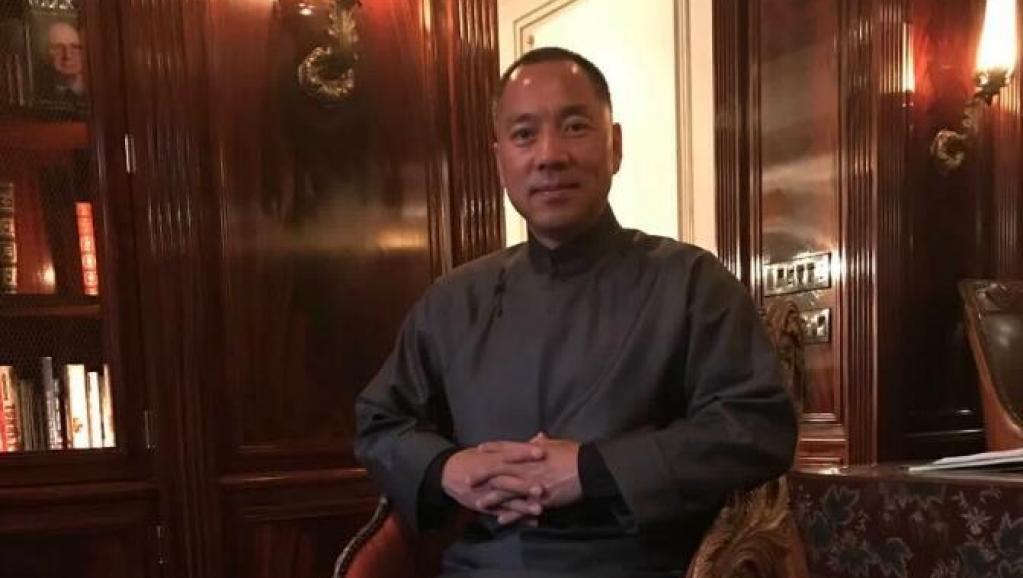As former insider to Chinese security affairs Guo Wengui awaits a decision on his pending application for political asylum in the U.S., the exiled billionaire’s shadow looms over the ongoing 19th Party Congress. Guo has promised to hold a parallel press conference that would shine light into the black box of elite Party politics (which he appears to have called off indefinitely, as his YouTube account has been suspended), and has claimed that he has classified information explaining the power-jockeying behind the the top leadership lineup that will be unveiled at the meeting. As Beijing continues its attempts to silence Guo, a new report show that President Trump was ready to hand Guo over to Chinese officials after being delivered a request from Beijing via a onetime rival turned political ally and friend.
Reporting on a May meeting between Guo and security officials who were unauthorized to be in the U.S. conducting official business, The Wall Street Journal’s Kate O’Keeffe, Aruna Viswanatha, and Cezary Podkul explain how China’s quest for Guo’s return resulted in serious diplomatic confusion in D.C., and a tit-for-tat between Washington and Beijing:
Liu Yanping, the lead official, said he had come on behalf of Beijing “to find a solution,” according to Mr. Guo and a partial audio recording Mr. Guo said he made of the May encounter and posted online in September.
[…] The dramatic meeting sparked an unresolved debate within the Trump administration over the Guo case and laid bare broader divisions over how to handle the U.S.’s top economic and military rival, according to people familiar with the matter. U.S.-China relations have been upset by disagreements over trade, cyberespionage and policy toward North Korea, and Mr. Guo’s New York stay is only adding to the tension.
[…] The Chinese officials, who were in the U.S. on visas that didn’t allow them to conduct official business, caught the attention of the Federal Bureau of Investigation, which wanted to move against them, according to people familiar with the matter. The bureau’s effort ran into friction with other U.S. officials, including those at the State Department, who have tended to favor a less-confrontational approach, according to the people.
[…] The episode took a twist when President Donald Trump received a letter from the Chinese government, hand-delivered by Steve Wynn, a Las Vegas casino magnate with interests in the Chinese gambling enclave of Macau. Mr. Trump initially expressed interest in helping the Chinese government by deporting Mr. Guo, but other senior officials worked to block any such move, according to people familiar with the matter. […] [Source]
Steve Wynn is currently the Republican National Committee’s chairman of finance. Citing The Wall Street Journal’s report, CNBC’s Tucker Higgins outlines Wynn’s China-based financial interests, and reports on the influence that the letter appears to have had on President Trump:
Wynn’s China properties account for a significant share of his business. Those properties include the Wynn Macau and the Wynn Palace, a $4.1 billion gambling giant that opened in Macau in 2016.
[…] In 2016, the Macau properties accounted for more than 60 percent of the company’s net revenues, according to the company.
[…] According to the Journal, the letter Wynn delivered influenced the president. In a June meeting in the Oval Office the president referred to Guo as a “Chinese criminal” that the United States needed to immediately deport. [Source]
At Foreign Policy, Bethany Allen-Ebrahimian reports on Wynn’s attempt to do Beijing’s bidding as an indication that Beijing is learning how to influence Trump’s White House:
The incident demonstrates that the Chinese government has figured out who Trump listens to and how to mobilize these people to further their agenda inside the White House. In other words, they’ve cracked the Trump code.
[…] Chinese authorities understand there’s an opportunity to bring that kind of influence directly to the White House. The Trump administration has frequently sidelined the State Department, shutting career officials out of policy decisions and leaving dozens of important diplomatic posts unfilled. That’s left many foreign governments without clear interlocutors, and diplomats have spent the months since Trump’s inauguration seeking out other channels to communicate with the White House. [Source]
The Guardian’s Julian Borger, also citing The Wall Street Journal’s initial report, further describes unsuccessful attempts by FBI agents to thwart the unauthorized official business of Chinese security agents in May:
A group of officials from China’s ministry of state security, who entered the US on visas that did not allow them to conduct official business, visited Guo in his New York apartment in May, and used veiled threats in an attempt to persuade Guo to stop his accusatory tweets, which have a wide following in China, and return home. Guo shrugged off the pressure and made a recording of his conversation with the officials, part of which he posted online.
After that visit, FBI agents confronted the Chinese officials at New York’s Pennsylvania Station. The Chinese visitors first claimed to be cultural diplomats and then admitted they were security officials. The agents warned them they were violating the terms of their visa and told them to leave the country.
However, two days later, just before leaving the country, the Chinese officials paid a second visit to Guo, triggering a debate within the administration over whether they should be arrested. FBI agents were posted at John F Kennedy airport ready to carry out the arrests before the officials boarded their flight, but they were not made, after the state department argued it could trigger a diplomatic crisis. [Source]
Earlier this month, Guo Wengui tweeted a photo of himself with former White House chief strategist Steve Bannon. The two have reportedly met at least twice, though no information about the subject of their meetings is known. According to a report from the Financial Times, Bannon had previously met with Chinese security czar Wang Qishan, who is himself is the subject of several of Guo Wengui’s corruption allegations.







